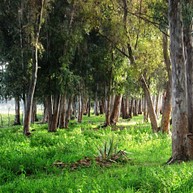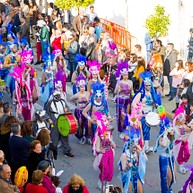
-
![Guadalete River]() Provided by: Ayuntamiento de Bornos
Provided by: Ayuntamiento de Bornos

Our travel guides are free to read and explore online. If you want to get your own copy, the full travel guide for this destination is available to you offline* to bring along anywhere or print for your trip.
*this will be downloaded as a PDF.Price
€4,95
Sport Complex "Embarcadero"
The guide was updated:Bornos' extensive trails and landscape is the perfect place to try your hand at water sports, land sports and aerial sports. Examples of activities available include canoeing, sailing, windsurfing, water skiing, fishing, kite surfing, kayaking, parasailing, stand up paddle, fly board, and banana boat.
Useful Information
- Address: Paseo Fluvial Pepe Duarte
- Website: www.facebook.com/nauticolagodebornos
Digital Travel Guide Download
Our travel guides are free to read and explore online. If you want to get your own copy, the full travel guide for this destination is available to you offline* to bring along anywhere or print for your trip.
*this will be downloaded as a PDF.Price
€4,95

The 16th century Renaissance garden of the Ribera Palace embraces an Italian style little-found in Andalusia. Geometric shape, terraces, and pruned plants nod to the Roman tradition. Discover statues and grottoes tucked away in the expansive grounds. Native flora include Laurel, Rosemary, Ivy, Myrtle, Cypress, and Night jasmine.
Read more

The Loggia — Unique in Spain
The Loggia is a gallery or succession of arches. Originally a private museum for entertaining the Ribas family guests, these grounds are dotted with statues and objects of historical interest. This is the only Loggia in Pompeian style in Spain, and pays homage to the Ribas' cultural and artistic influence on the local region.
Read more

Parish Church of Santo Domingo de Guzman
This church features two distinct architectural styles: Gothic and Baroque. Estimated to date from the late 15th or early 16th century, the most valuable piece of this church is the stone situated in the facade — this is dedicated to the holy martyrs buried here.
The interior is full of artistic treasures such as The Main Baroque Altarpiece, baroque sculptures representing the Immaculate Conception, and a 17th century wood carving attributed to La Roldana.
Read more

Calvary Chapel
This 16th century chapel boasts Baroque features and Solomonic columns.
Read more

Casa Ordoñez
This noble Baroque building dates from the second half of the 17th century. The facade has a large doorway framed between two Tuscan Order pilasters of fluted shaft and sober entablature. Both the entrance and the coats of arms are carved in pink marbled stone.
The different spaces and chambers are organized around a main courtyard with upper gallery; at ground level we find a first body of arches resting on Tuscan marble columns, the upper level is a gallery of rectangular balconies. There is also an additional yard, simpler, with a gallery of arches at ground level on one side and on the upper level of the other side a landscape-observation gallery crowned by cubical body battlements with pyramidal tops. The structure's load-bearing walls are made of rammed earth and slab with fully treated and restored wooden beams for its floors and ceilings.
Read more

Corpus Christi Convent
Don Per Afan de Ribera, first Duke of Alcalá, Marquis of Tarifa, sponsored the construction of this convent in the late 16th century. Occupied by nuns of the Cistercian order and later Clarissian nuns of the Franciscan Order.
The building itself consists on two floors, with an arcaded courtyard of semicircular arches on the ground floor. The entire structure is built in stone and brick. In addition, it has a beautiful staircase with a superb carved stone balustrade and a domed ceiling with a magnificent decoration.
Read more

The Arch Mill
This mill is one of at least 10 hydraulic constructions erected along the "Ribera de los Molinos" (The Mills Riverbank) in the 16th century. This building, popularly known as The Wide Mill, is one of the best preserved sections of this waterway and offers visitors a chance to learn about its architecture and history.
Read more

Sport Complex "Embarcadero"
Bornos' extensive trails and landscape is the perfect place to try your hand at water sports, land sports and aerial sports. Examples of activities available include canoeing, sailing, windsurfing, water skiing, fishing, kite surfing, kayaking, parasailing, stand up paddle, fly board, and banana boat.
Read more

Path "To the Dam"
An easy 2-hour trail beginning in La Islita and exploring the tunnels and gorges of Bornos dam, this path is known as the "Angostura", bordering the valleys and lake.
Read more

Path of the Eucalyptus
Enjoy a tranquil 2-hour walk among the eucalyptus trees on the banks of the Guadelete river. Apart from the natural sights, you'll come across two old mills from the 16th century: Molino Huerta Larga and Molino Zara.
Read more

Carnival
The Carnival is a lively party at which everyone is welcome. Attendees typically don disguises and masks, and the streets fill with groups of chirigotas, comparsas, or a special type of murga that is indigenous to Bornos.
Two weeks before the party, the Peña Carnavalesca de Bornos organizes the "Morcillá Popular". Beer and blood sausage can be tasted for free while the groups participating in the party present their songs. A provincial contest is held every year in the auditorium of the Corpus Christi Convent. Groups from the whole area participate. In any act of the contest you can enjoy an atmosphere of genius and magic.
Carnival takes place on the second weekend in the so-called Domingo de Piñata. A parade and costume contest mark the day.
Read more

Easter
In March/April, Bornos lights up with the intense Passion of Christ festival.
Read more

Traditional festivals
Visit Bornos in September to experience a local festival — La Feria Real. The remote origin of the fair, like most Andalusian fairs, is found in the 12th and 13th centuries and is tied to the economic and agricultural cycles of the region. The first part of the festival takes place in April and June and the celebrations are picked up again in August and September, during the heaviest harvest season and right after its end. Enjoy the traditional atmosphere, excellent food, refreshing wine from the Jerez area, dancing, singing and even equestrian events.
Read more


